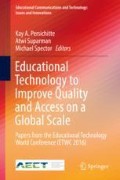Abstract
The quality of learning is determined by teacher performance, which is influenced by an individual’s competence and their confidence in teaching. The aim of this research was to gain an understanding of the causal relationship between competence and confidence in relation to teacher performance. We found that individual competence had a strong influence on confidence. Although there were limitations in the sampling, the findings of this study have implications for teaching performance. Further research could study differences and interrelations between social competence, personal competence, and professional competences, as well as other factors that affect the performance of teachers.
Access this chapter
Tax calculation will be finalised at checkout
Purchases are for personal use only
References
Åkerlind, G. (2003). Growing and developing as a university teacher –variation in meaning. Studies in Higher Education, 28, 375–390.
Civelli, F. (1998). Personal competencies, organizational competencies, and employability. Industrial and Commercial Training, 30(2), 48–52.
Dalley-Trim, L. (2007). Students’ observations and perceptions of teacher “performances” in the classroom. Australian Journal of Teacher Education, 32, 18–35.
Dilworth, M. E., & Imig, D. G. (1995). Professional teacher development and the reform agenda. Washington, DC: ERIC Digest.
Gläser-Zikuda, M., & Fuß, S. (2008). Impact of teacher competencies on student emotions: a multi-method approach. International Journal of Educational Research, 47(2), 136–147.
Hativa, N. (2000). Becoming a better teacher: a case of changing the pedagogical knowledge and beliefs of law professors. Instructional Science, 28, 491–523.
Hoy, W. K. (1990). Organizational climate and culture: a conceptual analysis of the school workplace. Journal of Educational & Psychological Consultation, 1(2), 49.
Hunter, M. (2013). Skills, personal competencies and enterprise capabilities throughout the organization lifecycle. Psycho-sociological Issues in Human Resource Management, 1(1), 37–107.
Lee, J. D., & Moray, N. (1994). Trust, self-confidence, and operators' adaptation to automation. International Journal of Human-Computer Studies, 40(1), 153–184.
Lenney, E. (1977). Women’s self-confidence in achievement settings. Psychological Bulletin, 84(1), 1.
Lester, F. K., Garofalo, J., & Kroll, D. L. (1989). Self-confidence, interest, beliefs, and metacognition: key influences on problem-solving behavior. In Affect and mathematical problem solving (pp. 75–88). New York: Springer.
Limsila, K., & Ogunlana, S. O. (2008). Linking personal competencies with transformational leadership style evidence from the construction industry in Thailand. Journal of Construction in Developing Countries, 13(1), 27–50.
Lindblom-Ylänne, S., Trigwell, K., Nevgi, A., & Ashwin, P. (2006). How approaches to teaching are affected by disciplinary and teaching context. Studies in Higher Education, 31, 285–298.
Lobman, C. (2011). Improvising within the system: creating new teacher performances in inner-city schools. Structure and Improvisation in Creative Teaching, 73–93.
Marilla Svinivki dan Wilbert J. McKeachie.(2006). McKeachie’s Teaching Tips: Strategies, Research, and Theory for College and University Teachers Thirteenth Edition (pp:146). Wadsworth : Cengage Learning
McDonald, F. J., & Elias, P. J. (1976). Beginning teacher evaluation study: Phase II, 1973–74, Final report: Vol. I. The effects of teaching performance.
Mowday, R. T. (1979). Leader characteristics, self-confidence, and methods of upward influence in organizational decision situations. Academy of Management Journal, 22(4), 709–725.
Muralidharan, K., & Sundararaman, V. (2009). Teacher performance pay: experimental evidence from India. Journal of Political Economy, 119, 33–77. National Bureau of Economic Research (No. w15323).
Nelson, L. (2013). The efficacy of a school-based eating disorder prevention program: building physical self-esteem and personal competencies. In Preventing eating disorders: a handbook of interventions and special challenges (p. 163). Philadelphia: Brunner/Mazel.
Ostrow, E., Paul, S. C., Dark, V. J., & Behrman, J. A. (1986). Adjustment of women on campus: effects of stressful life events, social support and personal competencies. Stress, social support and women.
Plomp, T., & Nieveen, N. (2007). An Introduction to Educational Design Research. Proceedings of the Seminar Conducted at the East China Normal University, Shanghai (PR China). Retrieved from: http://www.slo.nl/downloads/2009/Introduction_20to_20education_20design_20research.pdf.
Sadler, I. (2013). The role of self-confidence in learning to teach in higher education. Innovations in Education and Teaching International, 50(2), 157–166. https://doi.org/10.1080/14703297.2012.760777.
Svinivki, M., & McKeachie, W. J. (2006). McKeachie’s teaching tips: Strategies, research, and theory for college and university teachers (13th ed., p. 146). Wadsworth: Cengage Learning.
Spector, J. M., Merrill, M. D., Elen, J., & Bishop, M. J. (Eds.). (2008). Handbook of research on educational communications and technology. New York: Routledge.
Author information
Authors and Affiliations
Corresponding author
Editor information
Editors and Affiliations
Rights and permissions
Copyright information
© 2018 Association for Educational Communications and Technology (AECT)
About this chapter
Cite this chapter
Sumantri, M.S., Wardhani, P.A. (2018). The Influence of Competence and Self-Confidence on Elementary School Teacher Performance. In: Persichitte, K., Suparman, A., Spector, M. (eds) Educational Technology to Improve Quality and Access on a Global Scale. Educational Communications and Technology: Issues and Innovations. Springer, Cham. https://doi.org/10.1007/978-3-319-66227-5_24
Download citation
DOI: https://doi.org/10.1007/978-3-319-66227-5_24
Published:
Publisher Name: Springer, Cham
Print ISBN: 978-3-319-66226-8
Online ISBN: 978-3-319-66227-5
eBook Packages: EducationEducation (R0)

